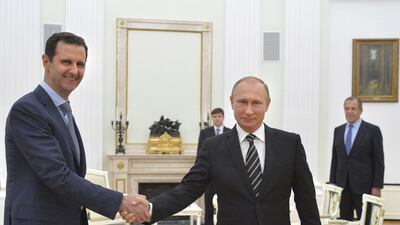Is it possible to imagine Syria without Bashar Al Assad? In the early years of the uprising, that is precisely what Syrians dreamed of. It is what they took to the streets to demand. It is what they died for. For a while it seemed possible. But when, two years ago last weekend, Russian jets took off on a bombing raid from a Syrian airbase in the west of the country, that dream began to die. Today, it no longer exists. The future of Mr Al Assad in Syria is secure.
The second anniversary of Russia's intervention in Syria passed almost without comment in the western media. But in Russia, it was greeted as a victory, a sign of Russia's rising power and of proof that Moscow can do what Washington cannot. It is certainly the case that Russia managed to take on a war that the US feared would become a quagmire and turn it around. Instead of, as the then US defence secretary Ashton Carter said, the Russian approach being "doomed to fail", it has actually succeeded on its own terms. As bitter a pill as it is for those who opposed Mr Al Assad's war on civilians to swallow, the intervention has altered the map of the Middle East.
____________________
Read more from Opinion
Why do secessionist movements rarely gather international support?
How six Islamist ideologues shaped jihadi activity in Britain
____________________
In two years, Russian air power changed Mr Al Assad's fortunes, and by proxy those of Hizbollah and Iran. By the summer of 2015, regime forces were simultaneously stretched thin and holed up. The regime had lost the ability to exert power across a majority of the country.
But with Russia and Iran on board, a fight-back began in earnest, one so determined it muscled out America's ambitions and even altered the views of Turkey itself. By the time the regime retook Aleppo a year later, it was clear the uprising, in its current form, was at an end. Far from opposing Russia, Turkey eventually sided with Moscow, even seeking to buy some of the weaponry Russia had deployed on the Syrian battlefield.
Syria today is still a kaleidoscope of competing interests, split between the regime, its lightly-allied Kurdish citizens in the north-east, the remnants of the Syrian rebels and ISIL, and a host of other, small, local militias. But the momentum has been lost. Only the regime can impose its will on the majority of the population, if not, yet, the majority of territory.
The Russian intervention has also changed the political conversation on the future of Syria. Publicly, western countries still maintain there must be a political transition away from Mr Al Assad. On the sidelines of the UN General Assembly in New York last month, the UK's foreign secretary Boris Johnson said western countries were determined there would be no reconstruction of Syria until a political process to remove Mr Al Assad was agreed. But such words were buried in the rubble of Aleppo. If the west does not want to reconstruct Syria, there are other countries who can and will. (Reconstruction, after all, can massively enrich those who carried out the destruction. See US firms in Iraq.) In time, and this is the tragedy, even that position will be tempered. Already at the UN General Assembly, a French minister warned a permanently fragmented Syria would mean more terrorism. And therein lies the regime's way out.
Because while Russia can guarantee that Mr Al Assad stays in power, and can use its considerable international leverage to keep the west from sanctioning the regime too much, what it cannot do is offer international respectability. That, ultimately, will be the most important guarantor of security for the regime. Moscow, increasingly belligerent towards, and feared by, the West is still treated as a pariah. It can keep the regime on its feet, but cannot guarantee a seat at the table. Instead, it will be ISIL and its offshoots who achieve that.
How? The double suicide bomb attacks in Damascus on Monday were just the start of a long guerrilla war against the regime. ISIL and its competitors Hayat Tahrir Al Sham sense that the regime could yet crumble from within. The next stage in the war of ISIL and its offshoots will be to weaken Syria and seek to take over Damascus – as they once tried to take over Baghdad.
____________________
Read more by Faisal Al Yafai
Trump’s 'rogue regimes' UN speech recalls Bush’s axis of evil
The genie of Kurdish independence will be hard to put back in the bottle
____________________
Terror attacks like the one last week will only increase, and it is there that the regime will face its most severe test. For all its protestations that the uprising was instigated by “terrorists”, the regime has very little experience dealing with the political and social consequences of terrorism. Part of the social contract of the regimes of the Al Assads has been stability; too many attacks will fray that contract.
A weakening of the regime and an emboldening of the terrorists – whichever group manages to win the internecine conflict for supremacy now taking place in Syria's ungoverned spaces – will frighten neighbouring countries and those further afield, from where many of the recruits will come and in whose cities attacks may be staged. Security cooperation will become the thin end of the wedge that ultimately brings the regime international legitimacy.
At the start of the uprising, the Assad regime, having carefully prepared for just such a challenge to its authority, cleverly empowered the extremists by releasing prisoners and avoiding the areas where ISIL was growing. In that way, their prophecy came true and terrorism really did grow out of the uprising. Now, once again, the fear of terrorism will come to the aid of the regime.
Follow The National's Opinion section on Twitter


